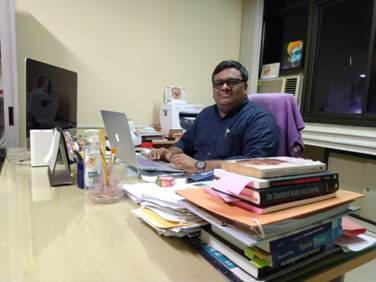Swarna Jayanti Fellow to explore the signatures of New Physics in Neutrino experiments
New Delhi: Sanjib Kumar Agarwalla, Associate Professor, Institute of Physics (IOP), Bhubaneswar, a Swarnajayanti Fellow of the Department of Science & Technology (DST), Govt. of India, will unravel the fundamental properties of massive neutrinos and explore the interesting signals of New physics in upcoming high-precision neutrino oscillation experiments.
Over the last two decades, several world-class experiments have firmly established the phenomenon of neutrino flavor oscillation which implies that neutrinos have mass and they mix with each other. Since neutrinos are massless in the new particle physics, also called Basic Standard Model of particle physics, there is a need to invoke BSM physics to accommodate non-zero neutrino mass and mixing. Several interesting BSM scenarios such as sterile neutrinos, non-standard neutrino interactions, neutrino decays, dark matter – neutrino secret interactions, and so on may affect the production, propagation, and detection of neutrinos.
Sanjib will probe these BSM effects at very high (TeV-PeV) energies (beyond the reach of modern colliders) by detecting astrophysical neutrinos from cosmic distances using giant neutrino telescopes such as Ice Cube at the South Pole, future Ice Cube-Gen2, and KM3NeT in the Mediterranean Sea. He has plans to investigate these BSM scenarios at low (MeV-GeV) energies using accelerator and atmospheric neutrinos travelling terrestrial distances. Future high-precision accelerator long-baseline neutrino oscillation experiments such as DUNE in USA, T2HK in Japan, and atmospheric neutrino experiment at the upcoming India-based Neutrino Observatory (INO) facility are supposed to measure the mass-mixing parameters with a precision of around a few %, and therefore, these upcoming experiments may be sensitive to various sub-leading BSM affects, which Sanjib is going to explore with his group at IOP.
His research is global and in tune with the international research program in neutrino physics. He will investigate the role of high-energy astrophysical neutrinos detected by big neutrino telescopes to reveal new fundamental particles and interactions, probing energy and distance scales far exceeding those accessible in the laboratory. He will study how various BSM scenarios may affect the outcome of currently running and upcoming high-precision neutrino oscillation experiments. The answers to these questions are important to correctly assess the outcome of any neutrino experiment. Sanjib has plans to use machine learning techniques in data analysis to develop selection criteria to separate signal and background in neutrino experiments.
Sanjib is an internationally prominent & well-recognized expert in Neutrino physics. He is a SIMONS Associate of ICTP and a sole winner of the prestigious B. M. Birla Science Prize in Physics, 2018. Sanjib has made several outstanding contributions in neutrino physics by publishing more than fifty (50) high-quality research articles in International Refereed Journals with high impact factors.
His full list of publications is available at https://www.iopb.res.in/~sanjib/Publication/Publications-Sanjib.pdf

